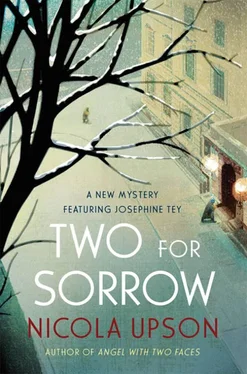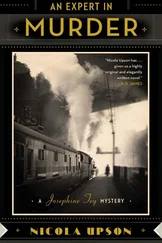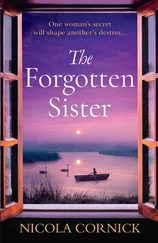Celia took her time in reading Josephine’s manuscript and, when she had finished, she went back to check a couple of passages. Eventually, she put the papers down on the table and reached for her drink. ‘You don’t have to be kind,’ Josephine said, annoyed with herself for feeling the need to break the silence. ‘I can take criticism these days.’
Celia smiled. ‘Kindness doesn’t come into it. It’s very powerfully done. A little too powerfully for my taste, perhaps—reading that brings it all back. No one can really know what it’s like to live through an execution unless he or she has been there—but this is close. Can I make a couple of comments?’ Josephine nodded. ‘It’s up to you, of course, and it depends how far you’re prepared to let truth stand in the way of a good story, but those last few hours would never be that peaceful. I can see that you want to highlight the relationship between the prisoner and the warder but, if you’ll excuse a rather tasteless pun, it was actually like Finchley Central in that cell. The world and his wife passes through on the morning of an execution: first the governor, and then the chaplain. I can’t speak for Walters, of course, but the chaplain was with Sach for some time. Oh, and the governor always asks the prisoner if she wishes to make any final statement.’
‘And did she?’
‘No.’
‘No last-minute confession, then?’
‘No. Neither Sach nor Walters ever made any sort of confession. Somebody once told me that Walters said she didn’t mind dying as long as Sach did, too, but I don’t know if that’s true. There was a great deal of bitterness between them at the end. Walters felt betrayed by Sach, who did everything she could to save her own skin; and Sach by the justice system, because she genuinely believed she was innocent. It was Walters who did the actual killing, you see, and Sach was careful never to get blood on her own hands. She was always very keen that we understood that, me and the other women who looked after her.’
‘Isn’t that worse? Getting someone else to do your dirty work?’
‘She certainly didn’t see it like that. In fact, I was surprised that her defence didn’t argue more strongly along those lines during the trial.’
‘So how exactly did Sach and Walters work things between them? The newspapers only tell half a story, and I’d rather hear it from someone who knew them.’
‘Well, Sach ran a nursing home and took in young women for the period of their confinement. Most of them were unmarried mothers, desperate to hide their shame and willing to go along with anything that would get them off the hook. Apparently, Sach told them she knew lots of women who were keen to adopt a child and offered to find their baby a good home.’
‘For a small fee, I suppose.’
‘Not so small. Most of them paid around thirty pounds, which was a lot of money then, especially for women of their class.’
‘So they handed over the money and never saw their baby again?’
‘Exactly. They all believed the children were going for adoption—or so they said, although I think some of them were too desperate to care what really happened—but in fact Walters took them and disposed of them. She was found carrying a dead child one day, and wasted no time in leading the police straight to Sach. Sach denied all knowledge of the killings, but no one believed her.’
‘Do you think she was guilty?’
‘You can’t think about innocence and guilt when you’re in that position—it’s not your job, and the only way you can do what you’re asked to do is by placing your faith in the system. Looking back, I think it was the right verdict, although both women felt very hard done by. They didn’t set eyes on each other from the moment of sentencing until the morning of the execution, but they were in adjoining cells and you could often hear them banging on the walls and accusing each other of being the guilty party.’
‘Was it your first execution?’
‘First and last, thank God. It was three years since a woman had been hanged in this country. Much was made at the time of its being the first female execution under the new king, as if a change of reign were somehow going to make a difference. And it was the very first hanging at the new Holloway. I suppose you could say they were trying it out.’ The bitterness in her voice was unmistakeable, and Josephine wasn’t surprised: hanging was a terrible death, and the fact that it was organised was scarcely likely to remove any of its horror. ‘None of us had ever assisted at anything like that before, and the fact that it was a double execution made it unbearably grim. To tell the truth, we were all hoping for a reprieve so that we didn’t have to go ahead with it. Even the hangman was dreading it, apparently.’
‘That was Billington?’
‘Yes, with two assistants—his younger brother and one of the Pierrepoints.’
‘It must affect you very deeply, being that close to a prisoner,’ Josephine said quietly, aware that she was stating the obvious but keen to get a better understanding of how Celia had really felt. ‘It’s a very strange relationship.’
‘I suppose it takes people in different ways. Some of the older warders were hardened to it by the time I met them. I’m sure they’d spent years trying to shake off the emotional impulses that are so instinctive to most of us. Some were so terrified by it that they had to leave the prison service altogether. But you’re right—no one was immune to it. It was destructive to us all in some way.’
‘And I dare say one or two enjoyed the notoriety. I can see that the more sadistically minded could dine out on it for years.’
‘I think you’re confusing us with crime writers.’
Celia smiled, but the sharpness of the rebuke was not lost on Josephine. ‘You don’t approve?’
‘Of your writing about this for pleasure? It depends how you do it, I suppose, but I do question why someone would choose to put herself through those emotions if she doesn’t have to—and why somebody would read about it to be entertained. Can I ask why you’re doing it?’
Josephine thought carefully before she answered. ‘I’ve never forgotten that night at Anstey,’ she said eventually. ‘When you broke the news to us, it was such a shock. We didn’t see anything, of course, and you saved us from the details of how Elizabeth must have suffered, but that made her death all the more powerful in our imaginations. You know how fanciful girls of that age can be and we were at a vulnerable time in our lives, worrying about our futures—I suppose we all felt the poignancy of how easily that future could be snuffed out. I remember being intrigued by what her mother must have been like and what drove her to do what she did. It wasn’t that long ago, and yet it seemed like a crime from a different age, something that Dickens would write about but not something we could reach out and touch in our own memories.’
Celia nodded. ‘Yes, I suppose it must have felt very alien to a group of modern young women.’
‘And of course we never found out who discovered Elizabeth’s secret and taunted her with the past, so there was a mystery there, something that we could speculate about for hours even though it was never likely to be solved. I spent days afterwards trying to put myself in that poor girl’s position, wondering about my own past and what I would find too terrible to live with.’
‘And?’
‘I don’t think shame would make me do it, if I’m honest, but I can understand how terrible it must be if you suspect you might be disposed to that sort of violence somewhere in your genes. Perhaps she thought there was a deep-seated cruelty in her which made her afraid of her own future—the sins of the mothers, and all that. It could be why she chose to end her life in that way—she thought her mother’s fate might one day be hers, so she took the punishment into her own hands.’ She smiled defensively. ‘Or perhaps that’s still the imagination of an eighteen-year-old talking.’
Читать дальше












